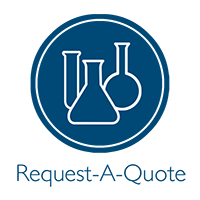This is for the determination of chemical oxygen demand (COD) from ground and surface waters, domestic and industrial wastes. The samples, blanks and standards are placed into sealed tubes and heated in an oven or block digester in the presence of dichromate at 150°C. After 2 hours the samples are removed from the oven or digester, cooled and measured spectrophotometrically at 600 nm. The colorimetric determination can also be determined manually.
The applicable range of the automated method is 3-900 mg/L and the range of the manual method is 20 to 900 mg/L.
Chlorides are quantitatively oxidized by dichromate and represent a positive interference. Mercuric sulfate is added to the digestion tubes to complex the chlorides.
No Obligation Quotation for Analytical Services
If you would like us to provide a quote for laboratory analysis, just provide us with as much information as you can about your project (the more, the better) and we'll provide you a quote via email. As you are searching or browsing our Analytical Guide, you'll see the Request-A-Quote icon... just click on it to start the request process.
| Hold Times, Preservatives, Preps, Collection, Analytical & Documentation | |
|---|---|
| Holding Time: | 28 days if samples are preserved samples and maintained at 4°C. |
| Preservatives: | Samples must be preserved with sulfuric acid to a pH <2 and cooled to 4°C as siib as possible after collection. |
| Required Preps: | 500 mL amber glass or plastic bottle |
| Collection Method: | Grab sampling |
| Analytical Methodology: | Spectrophotometer or Technicon Analyzer |
| Documentation: | |
| Analyte | Formula | CAS Number | Detection Limit | |
|---|---|---|---|---|
| Chemical Oxygen Demand | 3 |
mg/L | ||
* The analytes and detection limits listed for each method represent the typical detection limits and analytes reported for that particular method. Keep in mind that analyte lists may vary from laboratory to laboratory. Detection limits may also vary from lab to lab and are dependent upon the sample size, matrix, and any interferences that may be present in the sample.